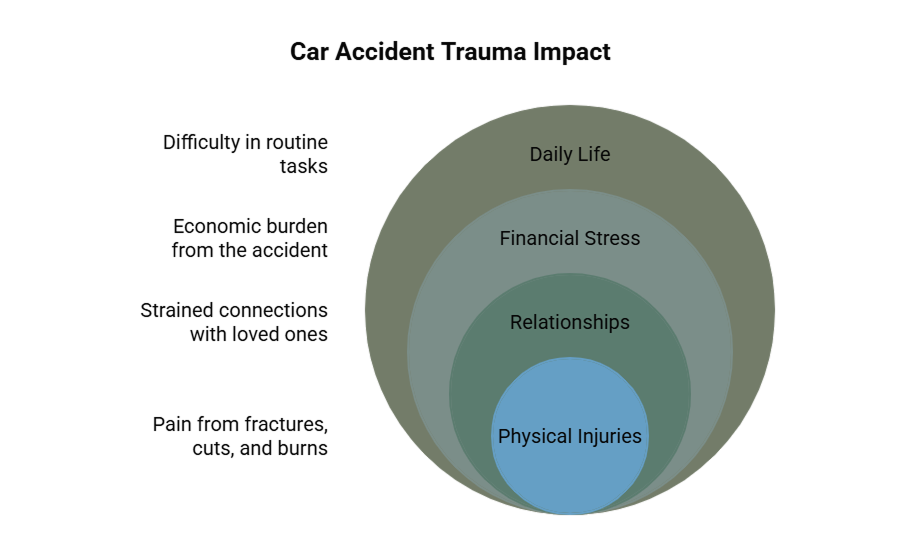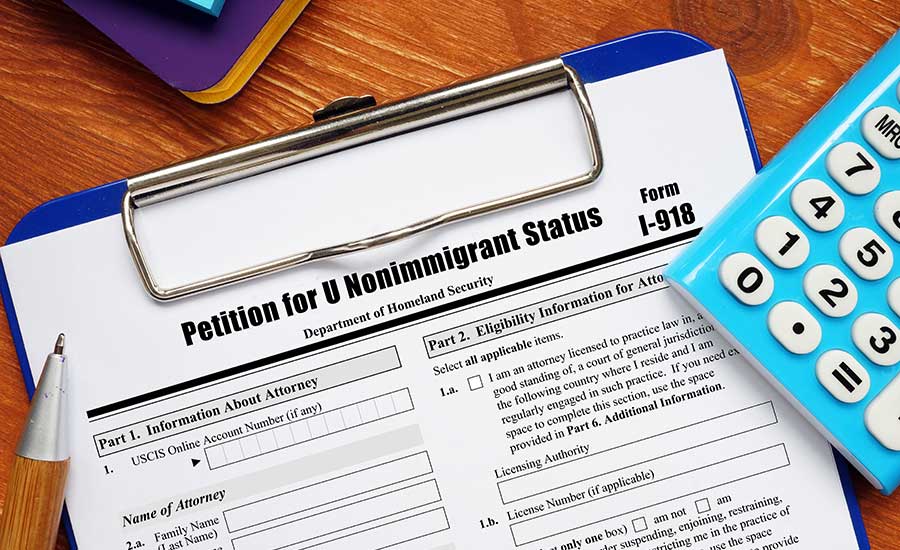

Car Accident Trauma: Key Takeaways
- A car accident can cause long-lasting trauma, including physical injuries, mental distress, and emotional difficulties
- Common psychological symptoms include nightmares, panic attacks, and memory loss
- Trauma can make it hard to work, study, or maintain healthy relationships
- Victims may be entitled to compensation for physical injuries and mental and emotional suffering
Only in May 2025, there were 7,477 accidents in New York involving motor vehicles. 3,222 of them resulted in injuries and fatalities.
Whether in the form of physical injuries or mental and emotional issues, car accident trauma can have long-term effects on your life.
We’ll explain:
- The types of trauma from a car accident
- The symptoms you should watch for
- How trauma affects victims
- What to do to deal with your condition
- How to start on a path to recovery
- Legal options to pursue
Types Of Car Accident Trauma
There are several types of trauma you can experience after a car accident.
Physical Trauma
Physical trauma after a car accident can take various forms:
- Fractures
- Back and neck injuries
- Leg, shoulder, hip or head injuries
- Organ or tissue damage
- Traumatic brain injury (TBI)
- Burn injuries
Depending on the severity of the injury, physical trauma may require medical treatment, surgery, hospitalization or subsequent rehabilitation, all of which can be costly.
Mental Anguish
Mental anguish, or psychological distress, includes mental, psychological or psychiatric injuries characterized by:
- Depression
- Anxiety
- Inability to handle ordinary life situations
Mental anguish can also lead to physical symptoms, such as high blood pressure, chest pains, headaches or muscle aches.
When mental distress goes unnoticed, it may lead to behavior changes and communication problems.
Emotional Distress
Emotional distress after a car accident is an emotional response characterized by:
- Anger bursts
- Crying
- Fatigue
- Hopelessness
- Loss of interest in daily activities
- Physical symptoms, such as stomach aches or headaches
Unaddressed emotional distress may spiral into memory and concentration issues, along with serious physical symptoms.
Post-Traumatic Stress Disorder (PTSD)
If you were involved in a serious car accident, you may develop post-traumatic stress disorder, a condition accompanied by:
- Nightmares
- Flashbacks
- Fear
- Estrangement
- Helplessness
Without treatment, post-traumatic stress disorder can lead to problems with managing aggression, metabolic issues, substance abuse and increased suicide ideation.
Adjustment Disorder
Adjustment disorder after a car accident is an excessive reaction to stress that may include:
- Agitation
- Trouble concentrating
- Alcohol or drug abuse
- Suicidal thoughts or behaviors
Some people don’t realize they’re struggling until the symptoms deeply affect daily life and long-term wellbeing.
Car Accident Trauma Symptoms To Watch For
While physical injuries may be easier to diagnose, it may be challenging to identify whether your mental and emotional state was affected by the car accident you were involved in.
You should be on the alert for the following:
- Lower energy levels
- Memory loss of the moments leading up to the car accident or after it
- Sleep disorders
- Weight fluctuations
- Lack of emotional response
- Increased hostility
- Feeling of loss or uncertainty
- Drowsiness and constant fatigue
- Recurring nightmares about the accident
- Trouble focusing and communicating
- Mood shifts
- Avoiding driving or riding in a vehicle
- Avoiding activities you enjoyed in the past
- Panic attacks
- Suicidal thoughts
If you are suffering from one or more of these symptoms after being involved in a car accident, you may be experiencing psychological trauma.
You should immediately contact a licensed and registered mental health counselor in your area or on televideo and seek expert advice about your condition.
How Trauma After A Car Accident Affects Victims
The aftermath of a car accident impacts various aspects of human life.
Even when physical injuries start to heal, emotional and psychological trauma can leave deep, invisible wounds, making it hard to work, attend school, or handle everyday tasks.
Trauma can also impact relationships, as survivors may feel angry or withdrawn, pushing away loved ones who don’t fully understand their feelings.
Financial stress can make matters worse, piling up therapy bills, lost wages, and unexpected medical expenses. Without the right support, many victims feel overwhelmed and alone, unsure where to turn for help.

How To Get Over Car Accident Trauma
If trauma isn’t acknowledged and treated, it can quickly take over your daily life.
To support your psychological recovery:
- Get enough sleep
- Keep a well-balanced diet
- Avoid alcohol and drugs
- Acknowledge your feelings
- Talk about your psychological state with your family members or friends, but do not talk about the details of the incident with anyone other than your lawyer.
- Share your feelings with your doctor and follow their recommendations about medication, therapists or mental health specialists that can help your healing process
- Find a support group where you can share your thoughts and feelings with people who have been through similar accidents
- Avoid reading or watching news about car accidents
- Consider Cognitive Behavioral Therapy (CBT) to find alternative ways for reshaping your negative thoughts and coping with emotional distress
Legal Options For Trauma After A Car Accident
If you were injured in a car accident, you may be entitled to compensation for both the physical injuries and psychological impact.
In no-fault states, such as New York, the vehicle you were in at the time of the accident will cover up to $50,000 in economic damages, regardless of who was responsible for the car accident.
This amount is meant to cover:
- Medical costs
- Lost wages
- Traveling for doctor appointments
- Household help
To pursue compensation for non-economic damages, such as mental and emotional suffering, and additional economic damages not covered by no-fault insurance, you must file a personal injury claim or a lawsuit.
The amount you seek can include expenses for counseling and mental health treatment, along with the pain and suffering brought on by psychological shock after the car accident.
You can file a claim or a lawsuit with:
- The at-fault driver’s insurance company
- Any party that is liable for the car accident, such as vehicle manufacturers or government agencies.
Keep in mind that proving the psychological effects of a car accident can be difficult, and you’ll need solid evidence to support your claim.
How Spar & Bernstein Can Help You Seek Compensation After A Car Accident
With 60+ years of experience in personal injury law, our knowledgeable attorneys at The Law Offices of Spar and Bernstein have hundreds of success stories behind their back.
We work with clients who have suffered physical and psychological trauma as a result of motor vehicle accidents, bus accidents, hit and run accidents, drunk driver accidents, Uber accidents, and pedestrian accidents.
We will:
- Provide a free consultation so you meet our team and share your story.
- Review your car accident case.
- Talk to experts to determine how the car accident impacted your physical and mental health.
- Collect evidence from your medical provider, therapist, employer or other witnesses explaining your condition, behavior or absences from work.
- File a personal injury claim or lawsuit within the legal deadlines.
- Communicate with insurance companies and courts on your behalf.
- Fight for a fair settlement for your psychological and emotional trauma.
- Take your case to court if an out-of-court settlement is not reached.
- Deduct our fees if and when we successfully resolve your case.
Car Accident Trauma: FAQs
How long does car accident trauma usually last?
There’s no set timeline, and it all depends on the severity of the injury. Some people recover within weeks or months, while others struggle for years if trauma is left untreated.
Can I claim compensation if I didn’t go to the hospital right after the accident?
Yes, but it will be more difficult, as you’ll need to prove the link between your car accident and your condition.
What kind of evidence can I use to prove emotional trauma?
To prove emotional trauma, you can use:
- Medical records from mental health professionals
- Therapy notes
- Prescription records for anxiety or depression
- Testimony from family, friends, or coworkers about changes in behavior.
Disclaimer: attorney advertisement. prior successful results do not guarantee a similar outcome





